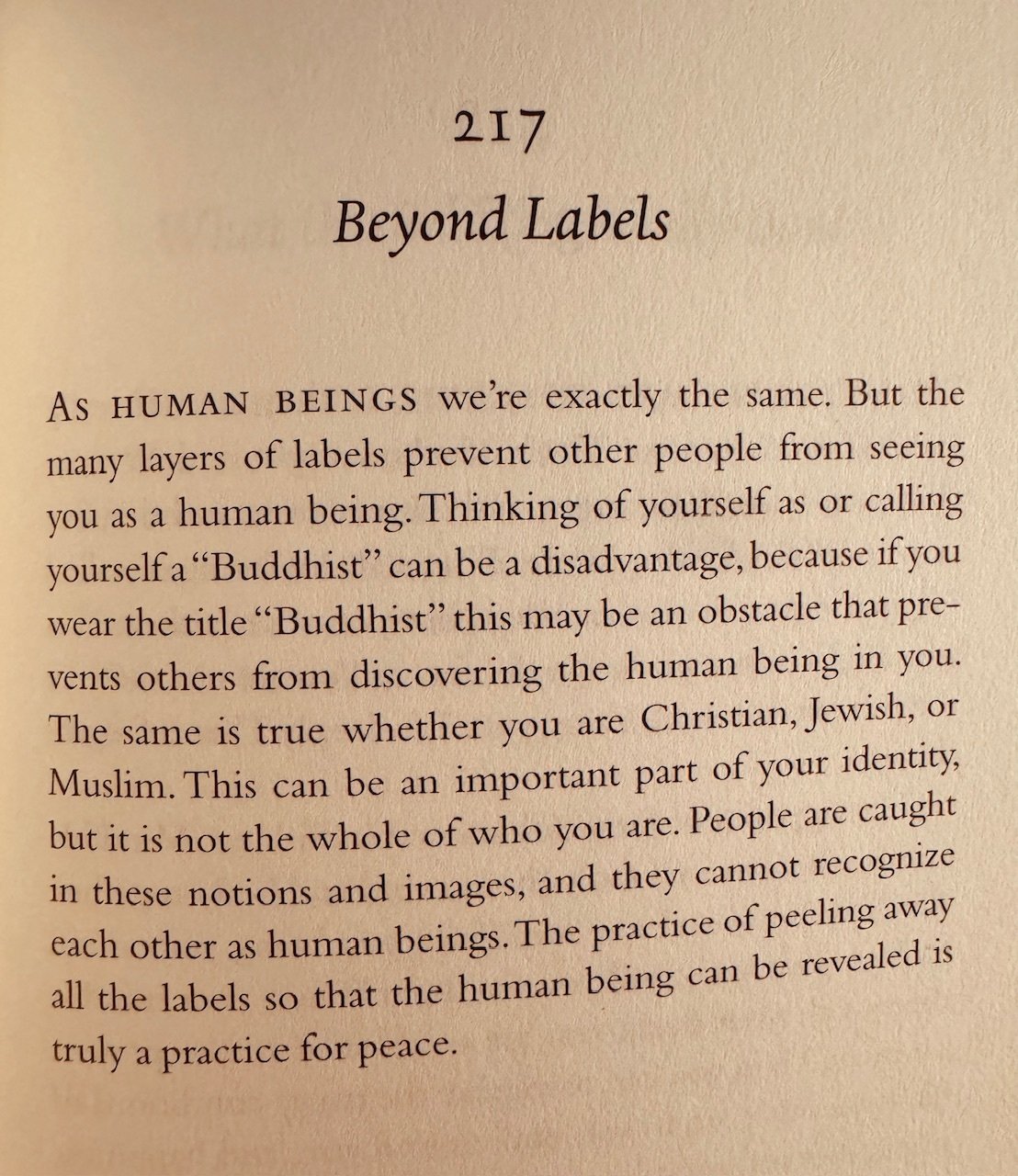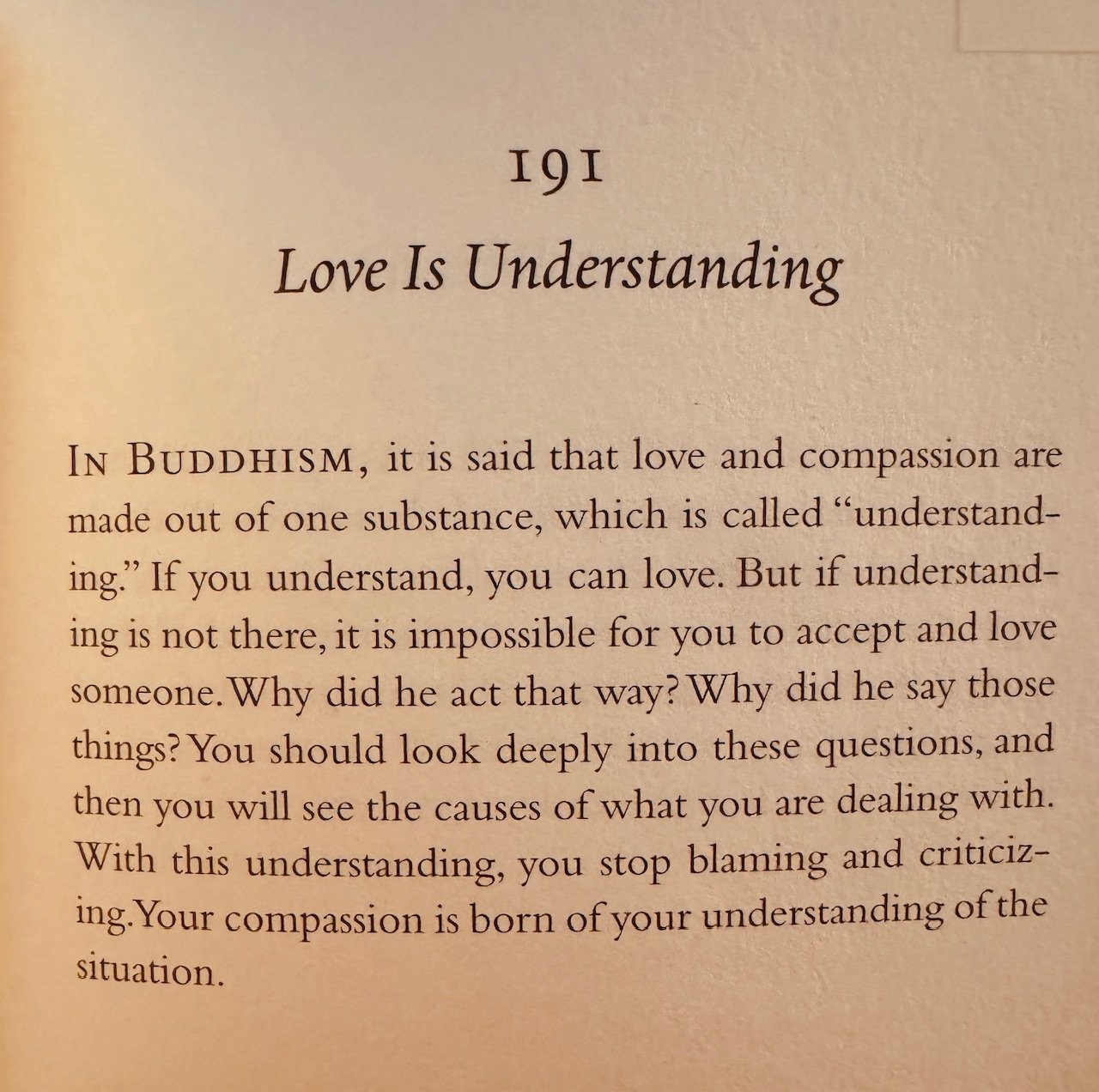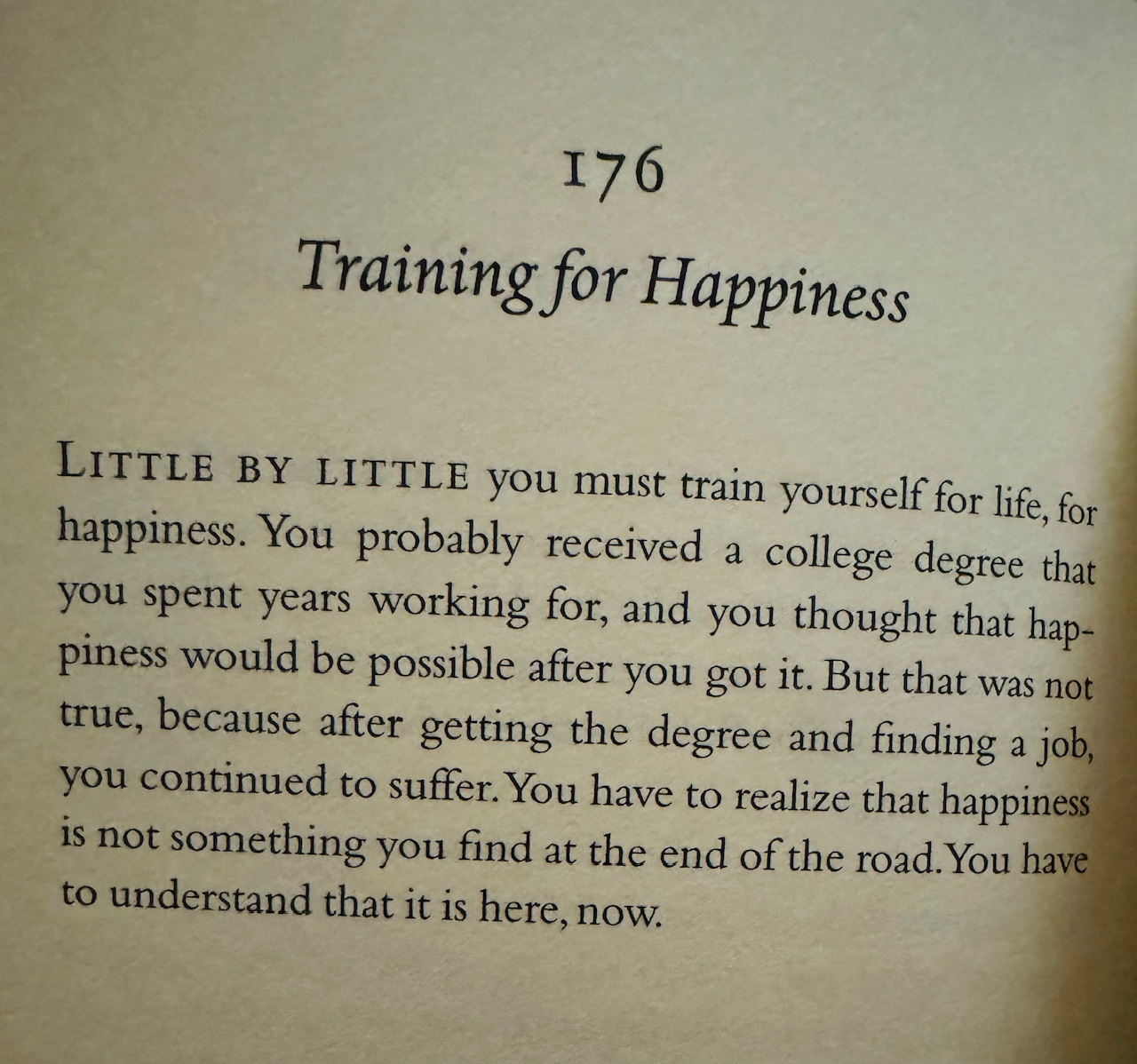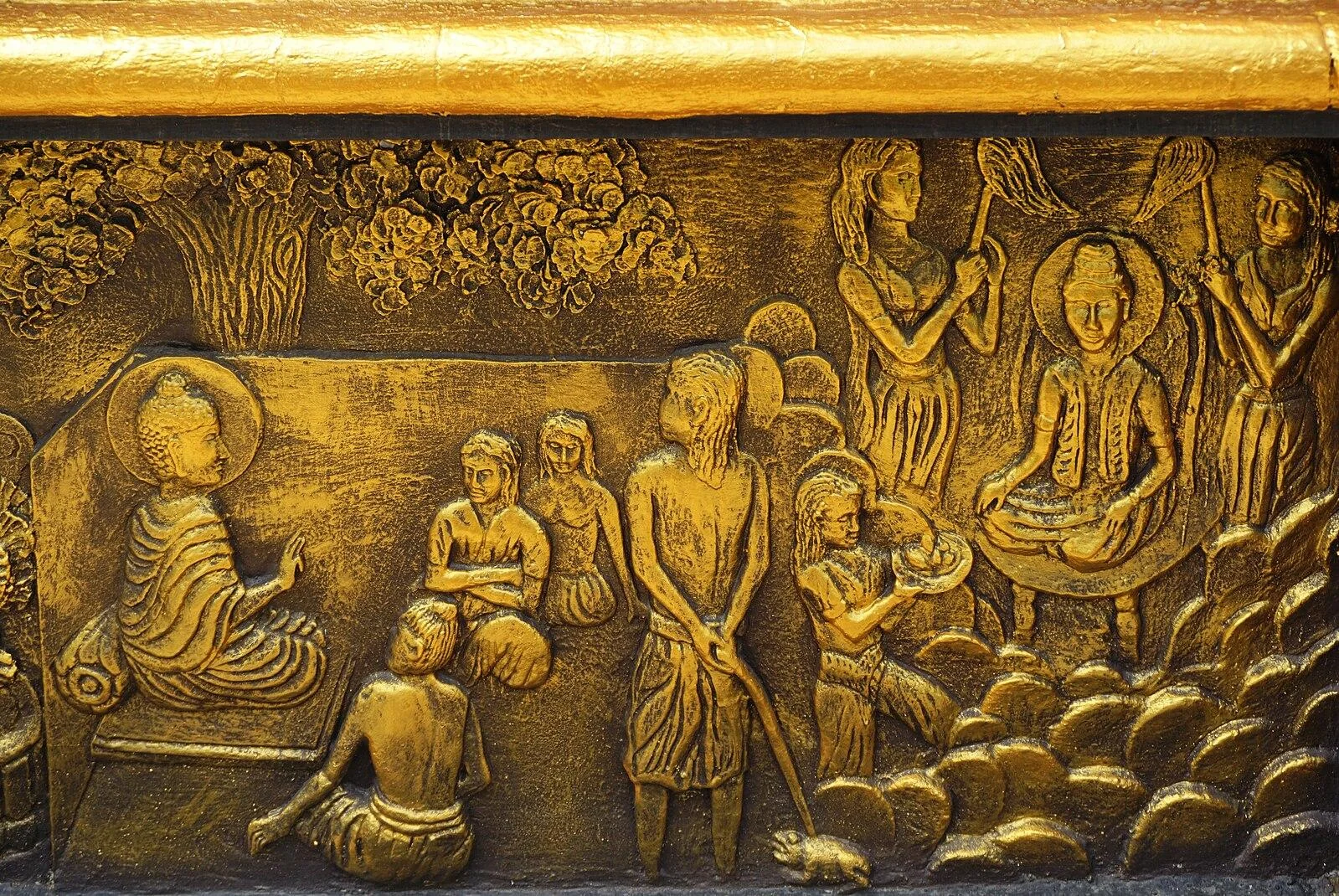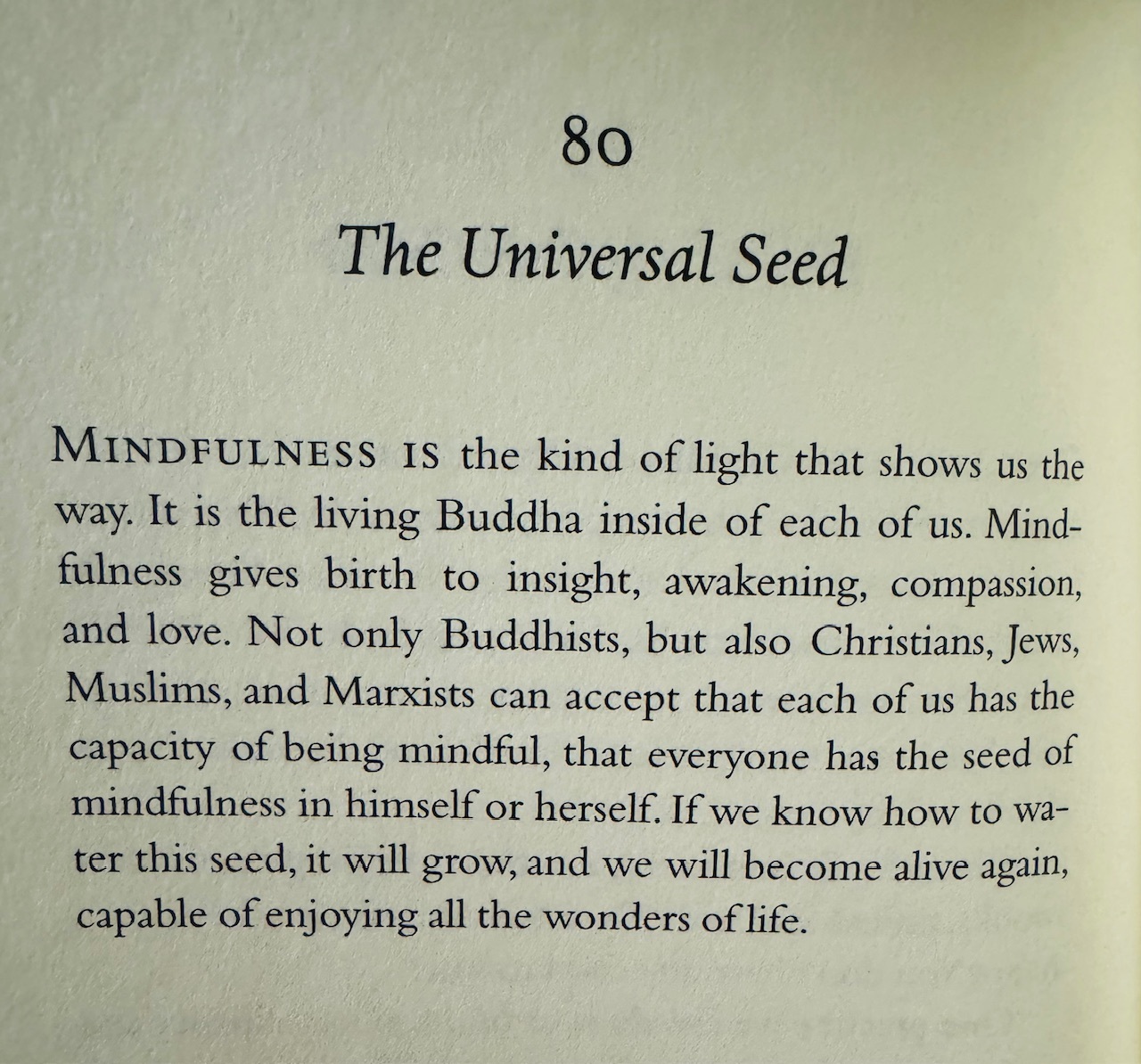A Discourse on The Full-Moon Night
On a full moon night with the Sangha at Sāvatthi, the Buddha answers a series of ten questions on the aggregates.
At one time, the Blessed One was residing in Sāvatthī, in the Eastern Park, in Migāra's mother's mansion, with a large assembly of bhikkhus. On that occasion, the Blessed One was sitting in the open air, surrounded by the bhikkhu assembly, on the full moon night of the Uposatha (observance day) of the fifteenth.
Then, a certain bhikkhu rose from his seat, arranged his upper robe over one shoulder, raised his joined palms towards the Blessed One, and said:
"Venerable sir, I would ask the Blessed One about a certain matter, if the Blessed One would grant me the opportunity for my question to be answered?"
"Then, bhikkhu, sit down on your own seat and ask whatever you wish."
"Very well, venerable sir," the bhikkhu replied, having assented to the Blessed One’s response. He sat down on his own seat and asked the Blessed One:
"Are these, venerable sir, the five aggregates subject to clinging, namely: form aggregate subject to clinging, feeling aggregate subject to clinging, perception aggregate subject to clinging, volitional formations aggregate subject to clinging, and consciousness aggregate subject to clinging?"
"These, bhikkhu, are indeed the five aggregates subject to clinging; namely: form aggregate subject to clinging, feeling aggregate subject to clinging, perception aggregate subject to clinging, volitional formations aggregate subject to clinging, and consciousness aggregate subject to clinging."
"Excellent, venerable sir," the bhikkhu, pleased and appreciative of what the Blessed One had said, asked another question:
"What, venerable sir, is the root of these five aggregates subject to clinging?"
"Bhikkhus, these five aggregates subject to clinging have desire as their root".
"Venerable sir, is that very clinging the same as these five aggregates subject to clinging, or is it something apart from the five aggregates subject to clinging?"
"Bhikkhu, that very clinging is neither the same as these five aggregates subject to clinging nor is it something apart from the five aggregates subject to clinging; but whatever desire and lust is therein, that is the clinging therein."
"Excellent, venerable sir," the bhikkhu asked further:
"Is it possible, venerable sir, for there to be moderation in desire and lust within these five aggregates subject to clinging?"
"It is possible, bhikkhu," the Blessed One said:
"Here, bhikkhu, someone thinks: 'May I be of such form in the future, may I have such feeling in the future, may I have such perception in the future, may I have such volitional formations in the future, may I have such consciousness in the future.' Thus, bhikkhu, there can be moderation in desire and lust within these five aggregates subject to clinging."
"Excellent, venerable sir," the bhikkhu asked further:
"How far, venerable sir, does the term 'aggregates' apply?"
"Whatever form, bhikkhu, past, future, or present, internal or external, gross or subtle, inferior or superior, far or near, all that is called the form aggregate. Whatever feeling, past, future, or present, internal or external, gross or subtle, inferior or superior, far or near, all that is called the feeling aggregate. Whatever perception, past, future, or present, internal or external, gross or subtle, inferior or superior, far or near, all that is called the perception aggregate. Whatever volitional formations, past, future, or present, internal or external, gross or subtle, inferior or superior, far or near, all that is called the volitional formations aggregate. Whatever consciousness, past, future, or present, internal or external, gross or subtle, inferior or superior, far or near, all that is called the consciousness aggregate. Thus far, bhikkhu, the term 'aggregates' applies."
"Excellent, venerable sir," the bhikkhu asked further:
"What, venerable sir, is the cause, what is the condition for the manifestation of the form aggregate; what is the cause, what is the condition for the manifestation of the feeling aggregate; what is the cause, what is the condition for the manifestation of the perception aggregate; what is the cause, what is the condition for the manifestation of the volitional formations aggregate; what is the cause, what is the condition for the manifestation of the consciousness aggregate?"
"The four great elements, bhikkhu, are the cause, the four great elements are the condition for the manifestation of the form aggregate. Contact is the cause, contact is the condition for the manifestation of the feeling aggregate. Contact is the cause, contact is the condition for the manifestation of the perception aggregate. Contact is the cause, contact is the condition for the manifestation of the volitional formations aggregate. Name-and-form is the cause, name-and-form is the condition for the manifestation of the consciousness aggregate."
"Excellent, venerable sir," the bhikkhu asked further:
"How does self-view arise?"
"Here, bhikkhu, an untaught ordinary person, who has no regard for noble ones and is unskilled and undisciplined in their Dhamma, who has no regard for true men and is unskilled and undisciplined in their Dhamma, regards form as self, or self as possessing form, or form as in the self, or self as in form; regards feeling as self, or self as possessing feeling, or feeling as in the self, or self as in feeling; regards perception as self, or self as possessing perception, or perception as in the self, or self as in perception; regards volitional formations as self, or self as possessing volitional formations, or volitional formations as in the self, or self as in volitional formations; regards consciousness as self, or self as possessing consciousness, or consciousness as in the self, or self as in consciousness. This is how self-view arises, bhikkhu."
"Excellent, venerable sir," the bhikkhu asked further:
"How does self-view not arise?"
"Here, bhikkhu, a learned noble disciple, who has regard for noble ones and is skilled and disciplined in their Dhamma, who has regard for true men and is skilled and disciplined in their Dhamma, does not regard form as self, or self as possessing form, or form as in the self, or self as in form; does not regard feeling as self, or self as possessing feeling, or feeling as in the self, or self as in feeling; does not regard perception as self, or self as possessing perception, or perception as in the self, or self as in perception; does not regard volitional formations as self, or self as possessing volitional formations, or volitional formations as in the self, or self as in volitional formations; does not regard consciousness as self, or self as possessing consciousness, or consciousness as in the self, or self as in consciousness. This is how self-view does not arise, bhikkhu."
"What is the gratification, what is the danger, and what is the escape in the case of form; what is the gratification, what is the danger, and what is the escape in the case of feeling ... perception ... volitional formations ... consciousness?"
"The pleasure and joy that arise dependent on form, bhikkhu, that is the gratification in form. That form is impermanent, suffering, and subject to change, that is the danger in form. The removal and abandonment of desire and lust for form, that is the escape from form. The pleasure and joy that arise dependent on feeling, that is the gratification in feeling. That feeling is impermanent, suffering, and subject to change, that is the danger in feeling. The removal and abandonment of desire and lust for feeling, that is the escape from feeling. The pleasure and joy that arise dependent on perception, that is the gratification in perception. That perception is impermanent, suffering, and subject to change, that is the danger in perception. The removal and abandonment of desire and lust for perception, that is the escape from perception. The pleasure and joy that arise dependent on volitional formations, that is the gratification in volitional formations. That volitional formations are impermanent, suffering, and subject to change, that is the danger in volitional formations. The removal and abandonment of desire and lust for volitional formations, that is the escape from volitional formations. The pleasure and joy that arise dependent on consciousness, that is the gratification in consciousness. That consciousness is impermanent, suffering, and subject to change, that is the danger in consciousness. The removal and abandonment of desire and lust for consciousness, that is the escape from consciousness."
"Excellent, venerable sir," the bhikkhu, pleased and appreciative of what the Blessed One had said, asked another question:
"How, venerable sir, for one who knows and sees, in this very life, with regard to this consciousness-containing body and all external signs, is there no I-making, mine-making, and underlying tendency to conceit?"
"Whatever form, bhikkhu, past, future, or present, internal or external, gross or subtle, inferior or superior, far or near, all form: 'This is not mine, this I am not, this is not my self,' thus, it is seen as it really is with right wisdom. Whatever feeling, past, future, or present, internal or external, gross or subtle, inferior or superior, far or near, all feeling: 'This is not mine, this I am not, this is not my self,' thus, it is seen as it really is with right wisdom. Whatever perception, past, future, or present, internal or external, gross or subtle, inferior or superior, far or near, all perception: 'This is not mine, this I am not, this is not my self,' thus, it is seen as it really is with right wisdom. Whatever volitional formations, past, future, or present, internal or external, gross or subtle, inferior or superior, far or near, all volitional formations: 'This is not mine, this I am not, this is not my self,' thus, it is seen as it really is with right wisdom. Whatever consciousness, past, future, or present, internal or external, gross or subtle, inferior or superior, far or near, all consciousness: 'This is not mine, this I am not, this is not my self,' thus, it is seen as it really is with right wisdom. This is how, bhikkhu, for one who knows and sees, in this very life, with regard to this consciousness-containing body and all external signs, there is no I-making, mine-making, and underlying tendency to conceit."
At that time, it occurred to a certain bhikkhu:
"So it seems, indeed, form is not-self, feeling is not-self, perception is not-self, volitional formations are not-self, consciousness is not-self; how then do actions performed by a not-self affect oneself?"
Then, the Blessed One, knowing with his mind the thought in that bhikkhu's mind, addressed the bhikkhus:
"There is this possibility, bhikkhus, that someone, being ignorant (misapprehending true reality), under the sway of craving, might thus misinterpret the teaching: 'So it seems, indeed, form is not-self, feeling is not-self, perception is not-self, volitional formations are not-self, consciousness is not-self. How then do actions performed by a not-self affect oneself?' You should be trained in this way, bhikkhus, regarding these matters.
What do you think, bhikkhus, is form permanent or impermanent?"
"Impermanent, venerable sir."
"Is feeling ... perception ... volitional formations ... consciousness permanent or impermanent?"
"Impermanent, venerable sir."
"And is what is impermanent suffering or happiness?"
"Suffering, venerable sir."
"And is it fitting to regard what is impermanent, suffering, and subject to change as: 'This is mine, this I am, this is my self'?"
"It is not fitting, venerable sir."
Therefore, in this way, bhikkhus, one understands: 'This is not mine, this I am not, this is not my self' with regard to all forms, feelings, perceptions, volitional formations, and consciousness, whether past, future, or present, internal or external, gross or subtle, inferior or superior, far or near. By seeing these aggregates in this way, one becomes disenchanted with form, feeling, perception, volitional formations, and consciousness. Through disenchantment, one becomes dispassionate. Through dispassion, one is liberated. With liberation, there comes the knowledge that one is liberated, and one understands: 'Birth is exhausted, the holy life has been lived, what had to be done has been done, there is no more coming back to any state of being.'
These are the ten questions posed by the bhikkhu:
Two concern the aggregates—
Asking if they are the same or distinct,
And about designation along with cause.
Two more relate to identity,
With one each on the themes of gratification,
And the consciousness-containing body.
The Buddha taught the most on the four noble truths. This teaching shares a series of common questions he was asked on the topic. Reflecting and investigating into the five aggregates to understand them, to see their origin, passing away and cessation is how one cultivates wisdom to operate with ease in the world and in harmony in one's personal and professional relationships.
Related Teachings:
Teachings on Living Beings and the Five Aggregates - A series of teachings on what makes a living being a living being and the five aggregates.
A lump of foam (SN 22.95) - The Buddha gives a series of similes for the aggregates: physical form is like foam, feeling is like a bubble, perception is like a mirage, choices are like a coreless tree, and consciousness is like an illusion.


